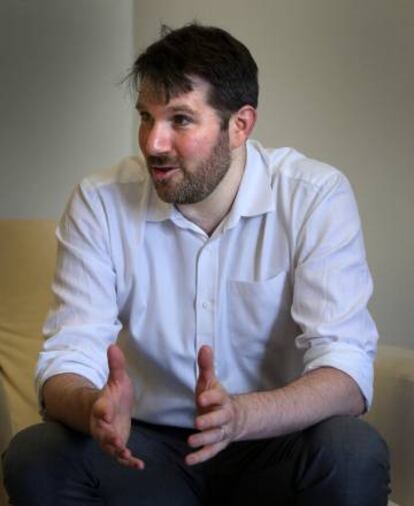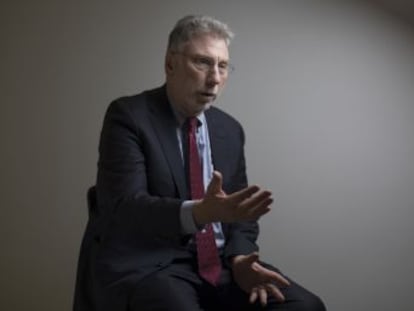“I don’t think Trump was elected just because of social media”
Leading internet entrepreneur and ideologue defends the use of viral content in social media

These are troubled times on both sides of the Atlantic, what with the angst caused by Brexit and the rise of Donald Trump to the US presidency. And while many people are wringing their hands over the outcome of these polls, Eli Pariser (Maine, 1980) has kept his cool: after all, he predicted all of this.
His 2011 book The Filter Bubble, now available in Spanish, explores how online platforms such as Facebook and Google use complex algorithms to filter the information that reaches users, in such a way that they end up being exposed only to ideas that reinforce their own beliefs, leaving out contrasting views. As Pariser wrote at the time, “democracy requires citizens to see things from other viewpoints, but instead of that we are increasingly isolated in our bubbles.”
Question. Can this concept of the filter bubble, which you made famous, explain the electoral results obtained by Donald Trump in the United States and by Jeremy Corbyn in the United Kingdom?
Answer. Yes and no. I don’t think Trump was elected just because of social media, and that’s probably because if you look at the way a majority of the voters who supported him are getting their news, it’s not primarily on Twitter, so they are not strong social media users. And, on the other hand, there’s the surprise that journalists and political elites got when Trump won. I think that can be explained with the filter bubble, because it made it easy for them to forget the realities that many Americans were living with. And the same is true in the United Kingdom.
For news content, the choices are either being engaging or not being seen
Q. People read print news less and less. Even news websites are losing out to the distribution of information by platforms such as Google or Facebook. This must have some effect on the vote…
A. Yes, absolutely. My point is only that I don’t think we have reached the point yet where most people are getting most of their news through these kinds of outlet. There’s a group of news junkies that are probably reloading newspaper home pages and kind of seeking out information in some particular way. But I think that it’s a very small part of the population. And then there’s a much wider group of people that are kind of expecting Facebook to give them something if it’s important. And, obviously, that’s the majority of the electorate and the majority of the population. And they are increasingly seeing news through these algorithms and via their friends.
Q. You came up with the concept of the filter bubble five years ago. A lot of things have changed on the internet since then. Does your idea still apply?
A. The basic concept does. There are these filters and then the stories that you see which are selected by algorithms. What I didn’t really realize when I wrote it is that the whole system became self-aware in the sense that now most media outlets are creating their stories with the express intention of reaching people’s feeds.
Q. Some people disagree with this concept. When we talk about a bubble, we are thinking about an isolated reader. But you could view the internet as a place to discover information and ideas that you didn’t even imagine existed in the first place.
The conspiracy rumors of old did not borrow the appearance of media in order to establish credibility
A. Yes, it can be an extraordinary tool for discovery. I can read the headlines of any newspaper in the world as easily as those of my home town, which was not possible 20 years ago. But there’s the question of how it can be used versus the question of how much people use it. The possibilities are different from the reality. Facebook is increasingly focused on videos, which you just passively watch. That is maybe less of a discovery experience.
[In 2012 Pariser founded Upworthy, a pioneer in the field of viral content websites. Its headlining style changed the rules of the game, with the classic example being: “Someone Gave Some Kids Some Scissors. Here’s What Happened Next.” Aided by the Facebook algorithm, Upworthy reached 80 million unique users. Soon after, it began penalizing those kinds of headlines, which it considers akin to cheating.]
Q. With Upworthy you realized that facts in themselves do not spark curiosity. Some emotionally appealing component is required. Can this method of viralization last?
A. Our methods at Upworthy were copied in ways that sometimes I’m happy about and sometimes I’m not happy about… our intention was to make the topics that matter entertaining, engaging and informative. If news content is going to have to compete toe-to-toe with entertainment content, then the choices are either being engaging or not being seen.
Q. Are you aware that many journalists regard the adjective “viral” as something demeaning for their work?
Facebook is increasingly focused on videos, which you just passively watch
A. Yes. There’s some complexity and rigor that can be lost, and you need to take steps. For example, Upworthy has a dedicated fact-checking team that is actually very rigorous. I think that viral media is, quite simply, content people are willing to share with their friends. I think that’s not a bad aspiration actually, because if you can meet that part, then you have done people a service of some kind.
Q. You had an experience at Upworthy that would be a nightmare to newspaper editors like myself: a change in algorithms at Facebook that drives traffic down. How did you solve that problem?
A. If that is your fear, I cannot give you a very satisfying answer. We anticipated the changes that Facebook was going to make, and we moved in that direction.
Q. You turned Upworthy into a video platform.
A. Yeah. I think I’m a fatalist about internet platforms like Facebook or Google. Mass communication has already been transferred to them. It means ceding distribution power to them, and that they have an ability to control who gets in and who doesn’t. It is a problem, but I just don’t see what the alternative is these days if you are looking for scale. And so I really believe in making media that a lot of people engage with because I think that is really important if what you want to have is a democracy. That can’t be just a small group of highly educated, paying consumers that are the only people who are served.
Q. Speaking of democracy and stability, is fake news something new?
A. What’s new is the ability to reach millions of people with something that comes from an unheard-of media outlet. You could find past examples like conspiracy rumors, but they were not really media in the same way, and they certainly did not borrow the appearance of media in order to establish credibility.
English version by Susana Urra.
A revolution in political activism
At the dawn of social media, between 2004 and 2008, Pariser headed MoveOn.org, a platform for political activism used by a group of idealistic youths with a dream: to see a candidate named Barack Obama, who then had little support, make it to the White House. Its methods and dynamics, especially its use of crowdfunding, have since been copied copied around the world, including in Spain.
“I think a lot of people realized that it was possible to get politically organized in a different way. Earlier, everything was being done with ads and very measured campaigns using classic propaganda,” explains Pariser, who was in Madrid as a guest of the Telefónica Foundation, the Aspen Institute of Spain and Taurus. “Initiatives like that one showed people that it was worth it to get engaged. Politicians are no longer financed just by large lobbies or pressure groups, but by self-organized citizens.”









































